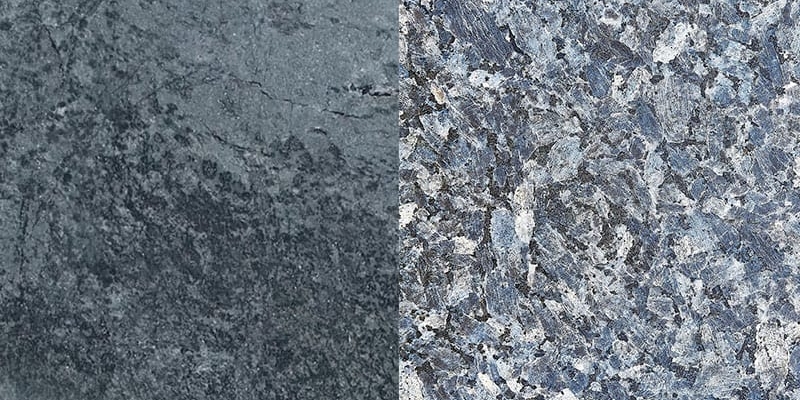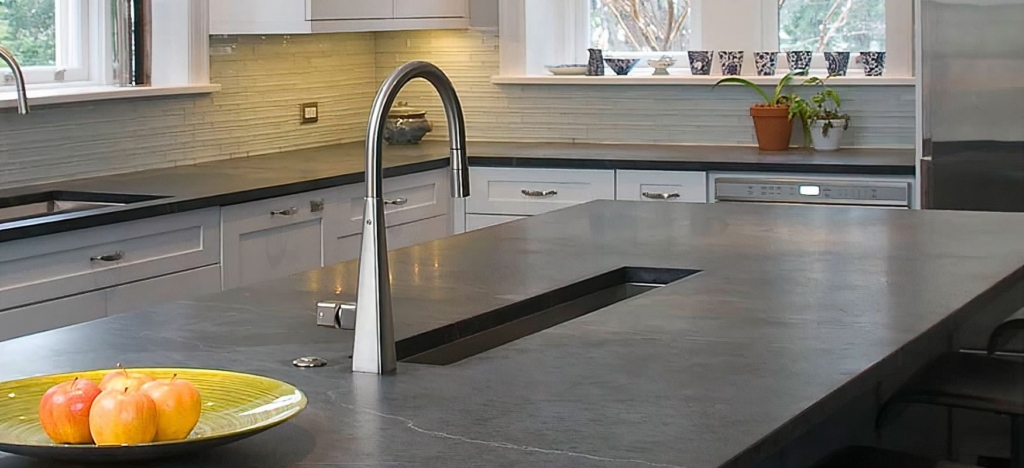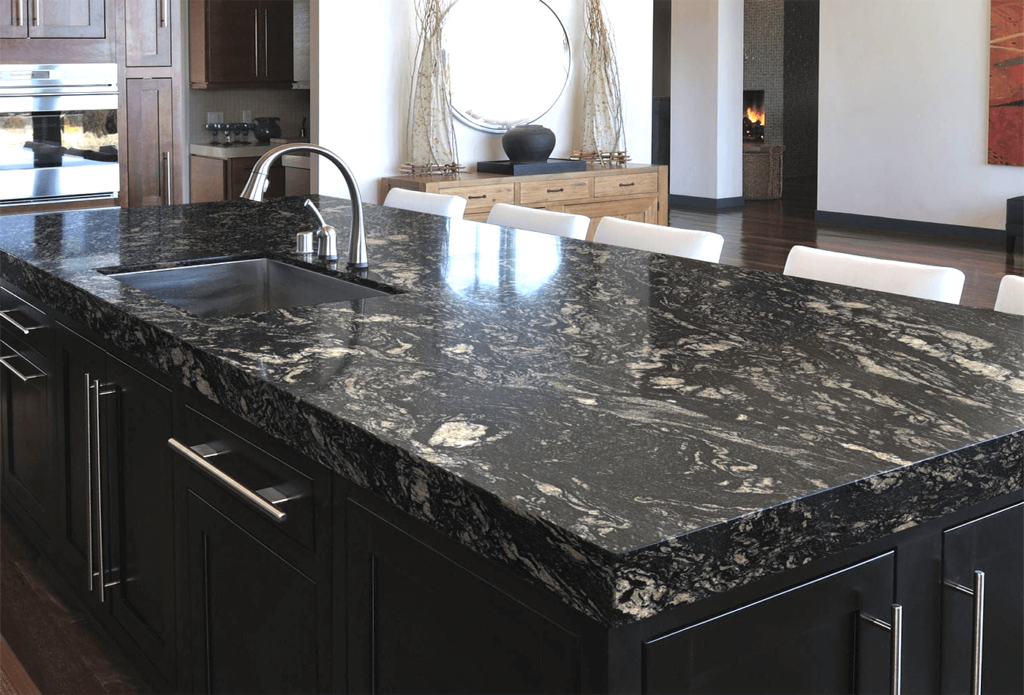


The Growing Popularity of Natural Stone Countertops in Ontario
When it comes to upgrading kitchens in Ontario homes, natural stone countertops remain one of the most popular investments. Among the many options, soapstone countertops and granite countertops stand out as two of the most sought-after materials. Both offer durability, beauty, and long-term value, but they differ significantly in terms of performance, maintenance, and overall practicality—especially for homeowners in Ontario, where climate, lifestyle, and property value expectations play a role.
This guide compares soapstone vs granite countertops in Ontario kitchens. Whether you’re renovating a downtown Toronto condo, upgrading a suburban Mississauga home, or building a custom cottage in Muskoka, understanding the differences between these two natural stones will help you make a smarter choice.

Soapstone is a metamorphic rock primarily composed of talc, which gives it a soft, smooth feel. Despite its name, soapstone is not fragile; in fact, it has been used for centuries in laboratories, stoves, and sinks because of its heat resistance and durability.
Color & Appearance: Typically ranges from light gray to deep charcoal with subtle veining. Over time, soapstone darkens naturally, giving it a rich, antique look.
Texture: Smooth and soft to the touch, often described as “buttery.”
Durability: Resistant to heat, stains, and acids, but prone to scratches due to its softer surface.
Maintenance: Requires periodic oiling to enhance color and mask scratches, but does not need sealing.
In Ontario homes, soapstone appeals to homeowners who value a rustic, timeless aesthetic. Its natural patina makes it perfect for country-style kitchens, cottage retreats, and heritage homes where character and warmth matter.
Granite is an igneous rock formed from cooled magma, known for its strength and striking natural patterns. It has long been considered the “gold standard” for countertops due to its hardness and resistance to daily wear and tear.
Color & Appearance: Available in a wide range of colors, from light creams and golds to dramatic blacks and blues, with unique speckling and veining.
Texture: Polished granite has a glossy, reflective finish, while honed granite offers a matte look.
Durability: Highly resistant to scratches, chips, and heat.
Maintenance: Requires periodic sealing to protect against stains and moisture penetration.
In Ontario, granite countertops remain a top choice for homeowners seeking luxury, durability, and resale value. They are especially popular in modern and high-end kitchens, as well as in real estate markets where buyers expect premium finishes.
Ontario’s diverse housing market—from century-old Victorian homes in Toronto to lakeside cottages in Muskoka—means that practicality depends on both aesthetic preference and functional performance.
Climate Factor: Cold winters and humid summers can affect natural stone differently. Granite’s sealing needs and soapstone’s scratchability may play into your decision.
Lifestyle Factor: Families who cook frequently may prefer granite’s hardness, while soapstone’s heat and stain resistance appeals to homeowners who entertain often.
Resale Factor: Granite tends to appeal to a broader range of buyers, while soapstone caters to a niche market seeking charm and uniqueness.
By comparing soapstone vs granite, Ontario homeowners can determine not only which stone fits their style but also which material offers the best long-term return on investment.
When Ontario homeowners begin exploring countertop options, granite almost always comes up as a top contender. Known for its timeless beauty, durability, and wide market availability, granite has long been a preferred choice for both traditional and modern kitchens across Canada. To better understand how granite compares to soapstone, it’s important to dive deeper into its strengths, weaknesses, and overall practicality in Ontario homes.
Granite is one of the hardest natural stones used in kitchens, second only to quartzite. This strength translates into a high level of scratch and chip resistance, making it ideal for busy Ontario households where the kitchen is a hub of daily activity.
Durability: Granite holds up well against wear and tear. Cutting directly on granite won’t damage the stone (though it will dull your knives).
Heat Resistance: You can place hot pans directly on granite without worrying about scorching or cracks—something that Ontario homeowners with busy cooking routines greatly appreciate.
Design Variety: Granite offers a wide array of colors and patterns, from subtle whites and grays to bold blues, greens, and blacks. Each slab is unique, making every countertop installation a one-of-a-kind feature.
For homeowners in Ontario who want a mix of resilience and aesthetic versatility, granite remains one of the most practical materials.
Despite its many strengths, granite does come with some drawbacks that buyers should consider.
Porosity: Granite is a porous stone, meaning it can absorb liquids like wine, oil, and juice if not properly sealed. Without sealing, stains can become permanent.
Maintenance: Granite countertops require sealing once a year to maintain their resistance to stains. Some high-quality sealers last longer, but regular upkeep is still recommended.
Cost: While granite pricing has become more competitive over the years, premium slabs can still be expensive, especially if the homeowner chooses rare patterns or colors.
In Ontario’s humid summers and cold winters, sealing becomes particularly important to prevent micro-cracks and staining caused by fluctuating temperatures.
Ontario has a strong supply chain for granite countertops, with multiple local suppliers offering a wide selection of slabs. Cities like Toronto, Ottawa, and Hamilton have well-established fabricators, making granite easier to source and install compared to more niche stones like soapstone.
Local buyers often appreciate that granite is widely recognized as a premium material in the real estate market. Installing granite countertops can increase property value and enhance a home’s appeal to potential buyers. This makes granite not just a practical option but also a smart investment.
For households with children, frequent cooking, or high-traffic kitchens, granite’s durability is a huge advantage. Homeowners can cook confidently without worrying about every little spill or hot pan. However, families who prefer a low-maintenance countertop with minimal upkeep may find the yearly sealing process inconvenient compared to other materials like quartz.
Key Takeaway: Granite countertops are an excellent choice for Ontario homeowners seeking strength, variety, and long-term value. While they do require periodic maintenance, their durability and aesthetic versatility make them one of the most practical countertop materials available in the province.

When comparing soapstone vs granite countertops, homeowners in Ontario often shift their focus from aesthetics to practicality. While beauty and elegance are important, the everyday performance of a countertop — its durability, upkeep, and functionality — usually determines the final choice. Ontario’s diverse climate, from humid summers to freezing winters, also plays a role in how these natural stones perform in real kitchens. Below, we’ll break down the most important practical considerations for Ontario homeowners evaluating soapstone and granite.
Durability is often the top priority for families in Ontario kitchens, where counters are exposed to everything from hot pots to heavy cookware.
Granite: Known for being extremely hard, granite is resistant to scratches, chips, and dents. With proper sealing, it also resists stains and water penetration, making it a long-lasting choice for high-traffic kitchens.
Soapstone: Though softer than granite, soapstone offers a unique advantage: scratches and minor dents can be sanded or buffed out. It may not be as resistant to chips as granite, but it is highly resistant to cracking under thermal stress, making it excellent for kitchens where hot pans are placed directly on the surface.
Ontario Insight: For busy family homes where countertops see constant use, granite is the more worry-free choice.
Ontario homeowners often cook hearty meals, which means countertops must handle hot cookware, baking trays, and more.
Granite: With high heat resistance, granite can handle hot pans, but it’s generally recommended to use trivets to prevent thermal shock that might cause cracks over time.
Soapstone: Exceptionally heat resistant, soapstone is often used in laboratories and even fireplaces. This makes it ideal for homeowners who prefer to place hot pots and pans directly on the surface without worrying about damage.
Ontario Insight: For chefs and home bakers in Ontario who love cooking large meals, soapstone edges out granite in pure heat resistance.
The level of maintenance required is often a deciding factor between soapstone vs granite countertops.
Granite: Requires sealing at least once every 1–2 years to maintain stain resistance, particularly against oils and acids. Without sealing, it may absorb spills, which is a concern in active kitchens.
Soapstone: Does not need sealing because it is naturally non-porous. However, to keep its signature dark patina, homeowners may apply mineral oil every few months. This is optional — the stone will naturally darken over time even without oiling.
Ontario Insight: If you want a low-maintenance option, soapstone may be the better choice. Granite, however, rewards its extra care with unmatched durability and long-term beauty.
Daily kitchen use often involves exposure to coffee, wine, citrus, and cleaning products.
Granite: Stain resistance depends on regular sealing. It resists most scratches and is less reactive to acids compared to softer stones like marble.
Soapstone: Immune to stains and chemical reactions due to its dense, non-porous structure. Even if scratched, marks can be sanded out easily.
Ontario Insight: Families who frequently entertain or cook with staining ingredients (wine, tomato sauces, etc.) may appreciate soapstone’s natural resistance.
Beyond performance, homeowners often overlook the tactile experience of their countertops.
Granite: Cool to the touch, making it excellent for pastry-making but potentially less comfortable in colder Ontario winters.
Soapstone: Warmer and smoother, giving kitchens a cozy, welcoming vibe that suits Ontario homes, especially during long winters.
Ontario Insight: If comfort and warmth are a priority, soapstone can make a kitchen feel homier, while granite offers a sleek, professional vibe.
Sustainability is increasingly important to Ontario homeowners.
Granite: Often imported from overseas, which may increase its environmental footprint.
Soapstone: Some quarries in North America supply soapstone, reducing transportation emissions. Its longevity and low-maintenance profile also make it eco-friendly.
When choosing between soapstone vs granite countertops, practicality often comes down to lifestyle.
Choose granite if: you want ultra-durability, a wide range of colors, and don’t mind occasional sealing.
Choose soapstone if: you prefer a naturally stain-resistant, low-maintenance surface with excellent heat tolerance and a softer, warmer feel.
Both materials can serve Ontario kitchens beautifully — it simply depends on your priorities in durability, maintenance, and day-to-day living.

When homeowners in Ontario think about installing a new kitchen countertop, the first question is usually “How much will it cost?” While the price tag is important, the cost goes beyond the initial purchase. Factors like tools, materials, time, and potential mistakes can significantly affect the final number. That’s why comparing DIY installation vs professional installation is essential.
For a do-it-yourself project, the first savings come from skipping labour costs. However, many hidden expenses often catch homeowners by surprise:
Tools & Equipment: Unless you already own professional-grade saws, clamps, levels, adhesives, and polishers, renting or buying them can add hundreds of dollars.
Transportation & Handling: Countertops are heavy, awkward, and fragile. Renting a truck or hiring movers can add to the bill.
Material Waste: Mistakes during cutting or fitting may force you to purchase extra slabs, which increases the cost.
Finishing Supplies: Sealants, caulking, edge polishers, and protective coatings are mandatory for a lasting finish.
On the professional side, labour is the biggest cost. However, what you’re paying for is not just labour but experience, precision, and guarantees. Professional installers in Ontario usually provide:
Accurate Measurement & Cutting with minimal material waste.
Efficient Installation with specialized tools.
Warranty Coverage on workmanship.
Safer Handling of heavy slabs, reducing risk of accidents.
Although upfront costs may seem higher, professionals often save homeowners from expensive mistakes.
Another important factor is time value. A DIY countertop project can take several weekends, especially for homeowners without prior experience. Professionals, however, can often complete the entire installation in just one to two days, minimizing kitchen downtime. For many busy Ontario families, this speed is worth the added cost.
Cost isn’t just about money—it’s about risk management. A cracked quartz slab or poorly sealed granite countertop can cost thousands to fix. Professionals carry liability insurance, which means if something goes wrong, you’re covered. With DIY, the risk is entirely yours.
Here’s a side-by-side breakdown of DIY vs Professional Countertop Installation in Ontario:
| Category | DIY Installation | Professional Installation |
|---|---|---|
| Material Cost | $50 – $200 per sq.ft. (same as pro) | $50 – $200 per sq.ft. (same as DIY) |
| Labour | $0 (self-installed) | $35 – $100 per sq.ft. |
| Tools & Equipment | $200 – $600 (purchase/rent) | Included in price |
| Transportation & Delivery | $100 – $400 | Often included |
| Waste from Mistakes | $200 – $800 (if errors occur) | Minimal (professionals cut precisely) |
| Finishing Supplies | $50 – $150 | Included |
| Warranty & Guarantee | None | Usually 1–10 years |
| Time Required | 2–4 weekends | 1–2 days |
| Risk of Damage | High | Low (insured) |
| Estimated Total | $2,000 – $4,500 (with risks) | $3,000 – $6,000 (all-in, safer) |
From a purely financial perspective, DIY installation may look cheaper at first glance. However, when you factor in hidden costs, risk of damage, and the value of your time, professional installation often provides better long-term value. For homeowners in Ontario looking for peace of mind, warranty coverage, and a flawless finish, hiring a pro is usually the smarter investment.